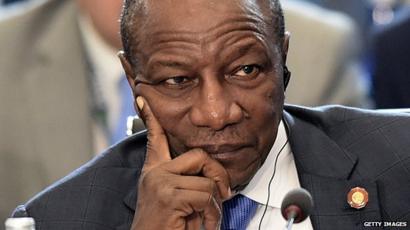Before his accession to power in Guinea in 2010, President Alpha Conde was widely admired and touted as “the Nelson Mandela of West Africa.”
In the space of a few minutes, on Sunday morning on the outskirts of Sekhoutoureya, the Guinean presidential palace, the octogenarian head of state fell from grace.
Sandwiched on a sofa by armed soldiers celebrating their coup, Conde slumped into silence and surprisingly witnessed the end of the road for him politically.
Re-elected last October for a third term in office against the backdrop of a bloodbath on Guinean streets, Alpha Conde has disappointed many who saw him as a human rights defender and a leftist activist when he was in the opposition.
Born in Boke, Lower Guinea, on March 4, 1938, the leader of the Guinean People’s Rally (RPG) has been in locked steps with the political life of his country for half a century.
His career has been full of twists and turns, during which he has been exiled, imprisoned and eventually held supreme power.
A teacher by training, he developed a taste for politics during his student years in France in the 1960s, within the Federation of Black African Students (FEANF), where he met future leaders of other African countries.
His involvement was mainly due to the fact that his country was living under the authoritarian regime of Sekou Toure, the father of Guinean independence.
From Paris, Conde set up an opposition movement which led to him being sentenced to death in absentia.
But it was after the death of Sekou Toure in 1984 that he decided to return to Guinea.
With other comrades, he founded the RPG, which was legalised in 1992 before becoming the RPG-Arc-en-ciel ten years later after merging with 44 other parties.
A troubled political life
Before his accession to power, he was successively defeated in the 1993 and 1998 presidential elections by General Lansana Conte before being arrested.
Sentenced to five years in prison, he was released after twenty months following international pressure.
He received a large support movement under the name of “Comité de liberation” of Alpha Condé.
Ivorian singer Tiken Jah Fakoly also composed the song “Libérez Alpha Conde,” which the youth turned into an anthem for African martyrs and political prisoners.
Conde then waited for the death of Conte in December 2008 and the collapse of the military regime led by Moussa Dadis Camara before finally gaining power in 2010, thanks to a disputed presidential election.
In that election, he succeeded in defeating his arch rival Cellou Dalein Diallo who had obtained 43.6 percent of the votes in the first round.
He was declared the winner of a runoff against Diallo by the Electoral Commission, polling 52.52 percent of the votes.
Since then, Alpha Conde has reigned supreme and managed to retain his grip on power, despite challenges from the street and the opposition, which accused him of manipulating the ballot box and tinkering with the constitution.
In the run-up to the October 18, 2020 presidential election, human rights organisations expressed concern about the level of violence used by his security forces during the repression of demonstrations that paved the way for President Conde to run for a third term.
An Amnesty International report estimated that “at least 50 people” had been killed between October 2019, when the National Front for the Defence of the Constitution (FNDC) began its mobilisation, and July 2020.
It also reported that 200 people had been injured, and that at least 70 people had been arrested and detained arbitrarily and incommunicado during the same period.
Conde swept aside by his “force”
Some pointed to the role of the Special Forces Group (GFS) in these pre-election abuses.
Placed under the authority of the Chief of Staff of the Army, this elite corps was created by Conde and entrusted to Lieutenant-Colonel Mamady Doumbouya, a former legionnaire of the French army with an imposing physique.
It was Doumbouya who delivered the fatal blow to Alpha Conde and his regime on the morning of Sunday September 5, 2021.
“Conde ousted by his special forces,” read the headlines of the Senegalese daily L’AS, which states that the new strongman in Conakry is “a legionnaire trained in Thies,” a city located 70 km from Dakar.
“This special force created by Alpha Conde has turned against him,” said Mamadou Aliou Barry, head of the Centre for Analysis and Strategic Studies of Guinea, on RFI.
Currently detained “in a safe place,” according to the putschists, Conde was photographed aboard a vehicle being taken to an unknown location, shortly after leaving Sekhoutoureya.
In the wake of his arrest, Conde refused to answer a masked soldier who asked him to confirm whether he had been tortured while under their custody.
But Mamady Doumbouya, who now heads the National Committee for Rally and Development (CNRD), said the deposed president has been allowed to “see a doctor.”
He did so shortly after ECOWAS demanded in a communique “respect for (his) physical integrity” and a return to “constitutional order or face sanctions.”
On the other hand, the threats by the international community seem to lack teeth for the moment since the leaders of the coup went ahead to dissolve the constitution and called for rewriting a new “constitution together, this time, (for) all of Guinea.”
In any case, some observers continue to consider this a political regression for Guinea and for Alpha Conde, given all the battles he had to wage before coming to power.
Words of the Senegalese geological engineer, Fary Ndao capture the scenario well.
He said on Twitter that “Alpha Condé was the idol of my father’s generation, who was committed to the left in the 1970s. Today, in 2021, Conde is being restrained and photographed by soldiers who are about the same age as me. All this because he felt that 10 years in power was not enough.”
ODL/te/lb/abj/APA


